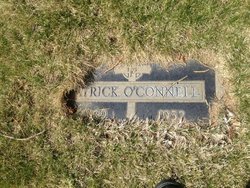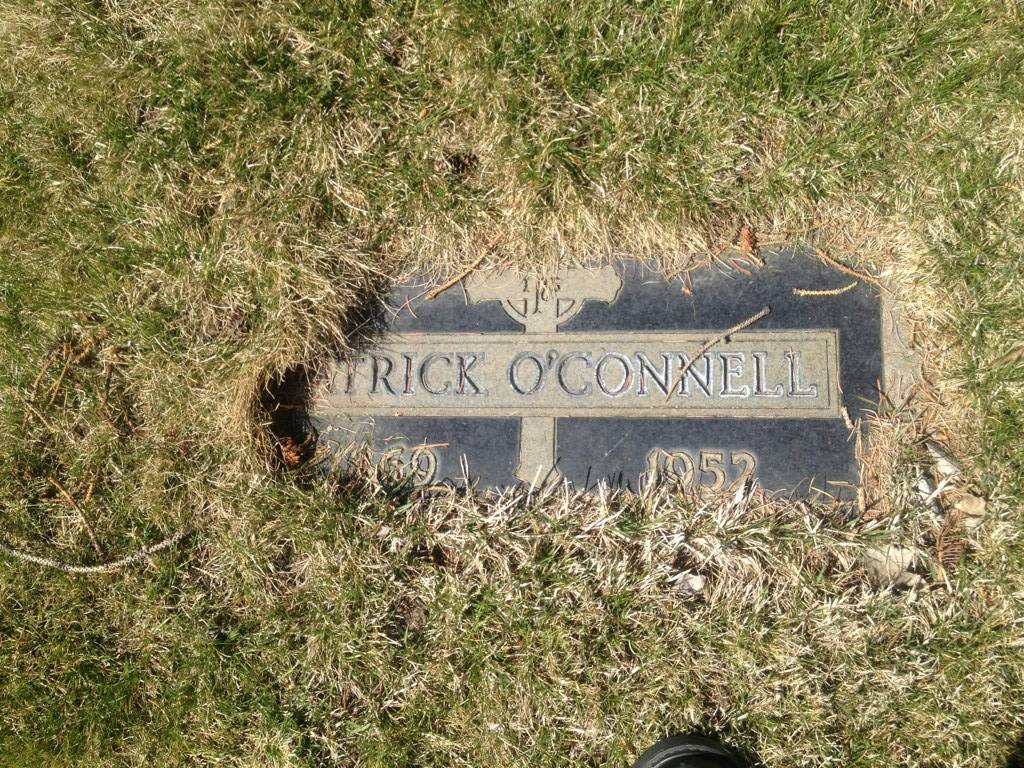To Geoffrey and Hanora O'Connell were born four sons, Geoffrey, Feb.6, 1863, ; John, June 9, 1865; Tim, Feb. 1, 1867; and Patrick, July 20, 1869. My father Patrick, and his brothers were all baptized at St. Joseph's Church in upper Glanmire, which is still in use today.
All of the boys went to school at Glanmire, my father through the fifth grade. That may have been as far as the classes went. English was the language used in school and in their home with a rich brogue thrown in, but many Gaelic words were still in use. The British had tried to force them to abandon the old language of their forefathers, but to this day many road and street signs are in Gaelic. Dad said their schools were mainly taught by men, and the boys acquired an education, as far as it went, that was comparable with that of American schools of that day. He wrote very legibly and could do any problems in math needed by a farmer or laborer of his time. All of his life he had a keen interest in politics like most Irishmen, and loved to got the daily news. Many years later, although short of money to feed his large family, he usually managed to get a daily newspaper.
Dad told of helping his mother care for yard, garden and chickens, and of milking the goats. There were trips to Glanmire to sell their milk or cream, driving one horse pulling a "juanting cart," a one-horse cart with a seat for passengers and a small wagon-bed for the milk cans and groceries.
After Mass on Sundays, the Irish liked to play ball games, and races in the roads near their villages, wrestling, dancing and card playing in the pubs. Certainly he took part in all of these also as he was a very sociable person, and enjoyed visiting and swapping stories with friends. Like most Irish he was very witty.
When they were older Dad and his brothers went to work for two farmers named Murphy, and the family moved into a cottage furnished them by the farmer. On December 29, 1888, their mother, Hanora, died. She is buried in the family plot at Ballyvinna cemetery where O'Connells were buried from 1724 to 1980. After their mother's death the young men began to think of migrating to America, and started saving their money for the move. In 1891, Geoffrey and John, the two older ones, sailed for America by ship, landing at New York, and from there westward by train to Iowa, where by this time many relatives were established.
They soon went to work at whatever work they could find and saved their money to send for their two younger brothers. The agreement was that when they all reached the new land they would again save their money and send for their father, for he was in his sixties now, and after they left, and with his wife gone, the old man was very lonely.
In the spring of 1892 my father and my Uncle Tim sailed on a ship out of Liverpool and Dublin for New York. Dad often told us of the long miserable journey across the Atlantic, packed in with many other immigrants, in steerage, third class, as they could not afford better passages. On the ocean, storms rocked the ship, and many people were very seasick. Crowdee into the hold of the rolling vessel, each with his own narrow bumk, they became very ill, and were glad to reach the upper deck for fresh air and relief. Someone was able to secure some lemoms, and sucking on a lemon was the only thing that could settle their stomachs, my Dad said. They reached New York harbor in April, 1892, and he often told us of going through Ellis Island where they were physically checked by a doctor, questioned about their ability to make a living, and registered. Then across to New York City by ferry, where they were to take a train for Iowa. I can imagine my Dad's excitement, seeing this city, the Statue of Liberty, and the new land.
As they were walking up the street, very hungry, they passed a bakery window full of pies, or tarts, I suppose. They looked so good that the young men bought three or four each and went up the street eating them. My Dad decided this America must be a pretty good place to live in for he had never had any of those good things before. In the British Isles a "pie" is a meat pie, a stew under biscuit pastry, I understand. Good, but different. I have no information on the young men's journey to Cherokee, Iowa, except that I know they were welcomed by their older brothers, Jeff and John, and soon found jobs at the only work they knew how to do, as hired hands on a farm...........more to continue...
To Geoffrey and Hanora O'Connell were born four sons, Geoffrey, Feb.6, 1863, ; John, June 9, 1865; Tim, Feb. 1, 1867; and Patrick, July 20, 1869. My father Patrick, and his brothers were all baptized at St. Joseph's Church in upper Glanmire, which is still in use today.
All of the boys went to school at Glanmire, my father through the fifth grade. That may have been as far as the classes went. English was the language used in school and in their home with a rich brogue thrown in, but many Gaelic words were still in use. The British had tried to force them to abandon the old language of their forefathers, but to this day many road and street signs are in Gaelic. Dad said their schools were mainly taught by men, and the boys acquired an education, as far as it went, that was comparable with that of American schools of that day. He wrote very legibly and could do any problems in math needed by a farmer or laborer of his time. All of his life he had a keen interest in politics like most Irishmen, and loved to got the daily news. Many years later, although short of money to feed his large family, he usually managed to get a daily newspaper.
Dad told of helping his mother care for yard, garden and chickens, and of milking the goats. There were trips to Glanmire to sell their milk or cream, driving one horse pulling a "juanting cart," a one-horse cart with a seat for passengers and a small wagon-bed for the milk cans and groceries.
After Mass on Sundays, the Irish liked to play ball games, and races in the roads near their villages, wrestling, dancing and card playing in the pubs. Certainly he took part in all of these also as he was a very sociable person, and enjoyed visiting and swapping stories with friends. Like most Irish he was very witty.
When they were older Dad and his brothers went to work for two farmers named Murphy, and the family moved into a cottage furnished them by the farmer. On December 29, 1888, their mother, Hanora, died. She is buried in the family plot at Ballyvinna cemetery where O'Connells were buried from 1724 to 1980. After their mother's death the young men began to think of migrating to America, and started saving their money for the move. In 1891, Geoffrey and John, the two older ones, sailed for America by ship, landing at New York, and from there westward by train to Iowa, where by this time many relatives were established.
They soon went to work at whatever work they could find and saved their money to send for their two younger brothers. The agreement was that when they all reached the new land they would again save their money and send for their father, for he was in his sixties now, and after they left, and with his wife gone, the old man was very lonely.
In the spring of 1892 my father and my Uncle Tim sailed on a ship out of Liverpool and Dublin for New York. Dad often told us of the long miserable journey across the Atlantic, packed in with many other immigrants, in steerage, third class, as they could not afford better passages. On the ocean, storms rocked the ship, and many people were very seasick. Crowdee into the hold of the rolling vessel, each with his own narrow bumk, they became very ill, and were glad to reach the upper deck for fresh air and relief. Someone was able to secure some lemoms, and sucking on a lemon was the only thing that could settle their stomachs, my Dad said. They reached New York harbor in April, 1892, and he often told us of going through Ellis Island where they were physically checked by a doctor, questioned about their ability to make a living, and registered. Then across to New York City by ferry, where they were to take a train for Iowa. I can imagine my Dad's excitement, seeing this city, the Statue of Liberty, and the new land.
As they were walking up the street, very hungry, they passed a bakery window full of pies, or tarts, I suppose. They looked so good that the young men bought three or four each and went up the street eating them. My Dad decided this America must be a pretty good place to live in for he had never had any of those good things before. In the British Isles a "pie" is a meat pie, a stew under biscuit pastry, I understand. Good, but different. I have no information on the young men's journey to Cherokee, Iowa, except that I know they were welcomed by their older brothers, Jeff and John, and soon found jobs at the only work they knew how to do, as hired hands on a farm...........more to continue...
Family Members
-
![]()
Patrick Aloysius O'Connell
1896–1983
-
![]()
Jeffery Rayphiel O'Connell
1897–1939
-
Philip Albert O'Connell
1899–1969
-
![]()
John Joseph "Jack" O'Connell
1901–1939
-
![]()
David Leo O'Connell
1906–1966
-
![]()
Timothy Francis O'Connell
1908–1977
-
Norene Margaret O'Connell Hill
1911–2009
-
![]()
Dorothy U O'Connell Piccolo
1913–2001
-
![]()
Mary C O'Connell Carstens
1914–1981
-
![]()
Edward Daniel O'Connell
1917–1999
Sponsored by Ancestry
Advertisement
Advertisement














